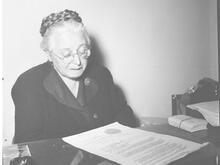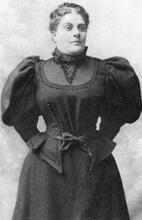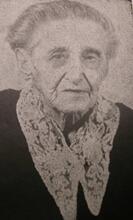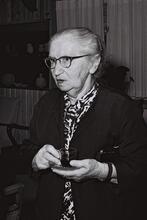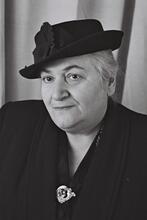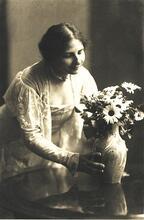Carrie Dreyfuss Davidson
Carrie Dreyfuss Davidson became an important voice for women in the Conservative Movement as a founder of United Synagogue’s Women’s League and founding editor of its journal Outlook. Wife of Professor Israel Davidson of the Jewish Theological Seminary, Davidson helped create the Women’s League, a framework for the Conservative Movement’s various women’s groups. In 1930 she became the founding editor of Outlook, for which she wrote editorials for twenty-four years. She also served as president of the Palestine Hebrew Culture Fund and treasurer of the American Pro-Falasha Committee, advocating for the acceptance of Ethiopian Jews into the Jewish community. After her husband’s death, Davidson spent two years writing a memoir of his life called Out of Endless Yearnings before resuming her work.
Founder and longtime editor in chief of Outlook magazine, Carrie Dreyfuss Davidson, born in Brooklyn, New York, on February 12, 1879, exemplified the often-competing paradigms of Jewish homemaker and accomplished writer and community leader. Introduced to many in American Jewish society as the wife of renowned Professor Israel Davidson of the Jewish Theological Seminary of America, this gifted woman eventually founded and fostered an array of significant organizations and publications.
The Women’s League and Outlook
Davidson’s most lasting public contribution was as a founder and board member of the United Synagogue of America’s National Women’s League. In 1918, she joined with a small group of women to create the league as a national framework for the Conservative Movement’s women’s groups. In 1930, Davidson established the league’s journal, Outlook, which remained under her editorial hand for almost twenty-four years. With the founding of the journal, Davidson took her place as a literary, religious, and political commentator for more than a generation of American Jewish women.
In the pages of Outlook, which included among its readers women and men who had no affiliation with the Conservative Movement, Davidson wrote about issues affecting the lives of Jews across the United States and the world. She gave voice to her strong convictions about the efficacy of early childhood education in both Jewish and other areas, her feelings about the position of the Jews, and Jewish women in particular, in the life of the nation, and her concern for persecuted Jews in other countries. Evident, too, were her stalwart convictions supporting a Judaism that was traditional and yet modern, and her deep devotion to Zionism. The latter was reinforced by her husband’s sabbatical in 1926–1927, which allowed the Davidsons, with their daughters Gladdie and Jessica, to spend six months in Palestine. Carrie Davidson’s views were conveyed through numerous articles and editorials and in a monthly book review column, the breadth of which showed its writer to be extraordinarily well read and intellectually discriminating.
Other political and cultural ventures
Davidson demonstrated her concern for the global condition of Jewry through a number of other ventures, both political and cultural. During the 1930s, she was president of the Women’s Division of Keren HaTarbut, the Palestine Hebrew Culture Fund, and treasurer of the American Pro-Falasha Committee. In the latter organization, where she was the only woman on the committee’s board, Davidson was an early and vocal advocate for the acceptance of Ethiopian Jews, sometimes called “falasha,” into the world Jewish community. She also took an active interest in the Jewish Theological Seminary’s Women’s Institute for adult education, and served on steering committees for the prestigious Menorah Journal.
Following her husband’s death in 1939, Davidson devoted herself to preserving his memory. She took a two-year leave of absence from editorial duties at Outlook to write an informative, if uncritical, memoir of her husband’s personal and academic life, entitled Out of Endless Yearnings. She also donated his 7,500-volume library on medieval Hebrew literature to New York’s City College, establishing the Israel Davidson Memorial Library, and gave his collection of medieval manuscripts to the Jewish Theological Seminary.
Davidson’s legacy
Carrie Davidson died on December 17, 1953. A fitting testament to her work and her personal philosophy can be found in her own words, written only days before her death and published as a tribute in the pages of Outlook.
A woman’s best years for learning and doing are those in which she raises a family. … When the children were put to bed, I attended college courses; I gave all the time possible to organizational work—going out to speak, being president of two organizations, establishing a Lit. "study of Torah," but also the name for organizations that established religious schools, and later the specific school systems themselves, including the network of afternoon Hebrew schools in early 20th c. U.S.Talmud Torah, editing a publication, writing articles for various publications. … Though I am now long past seventy … I have not yet begun to live in the past. … Young women, build your future now!
Selected works by Carrie Dreyfuss Davidson
Out of Endless Yearnings (1946).
Outlook (1930–1953).
AJYB 56:569.
Davidson, Carrie Dreyfuss. Henry Hurwitz/Menorah Papers. Box 9, folder 4, American Jewish Archives, Cincinnati, Ohio.
Obituary. NYTimes, December 19, 1953, 15:4.
WWIAJ (1938).



